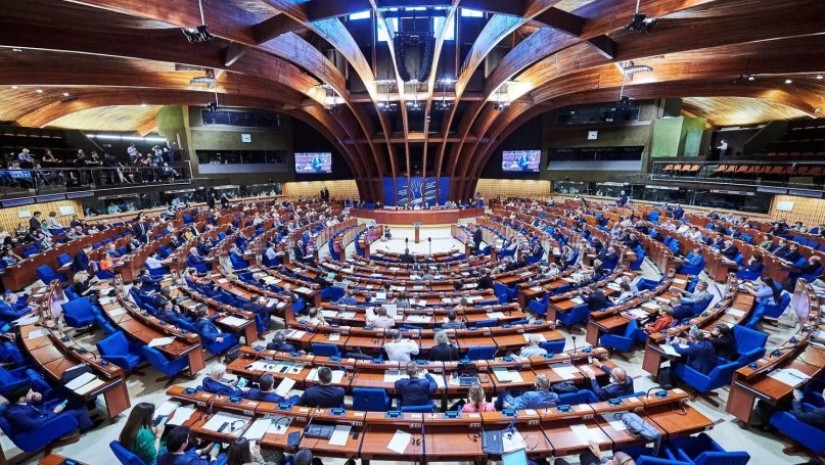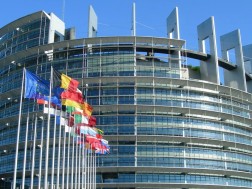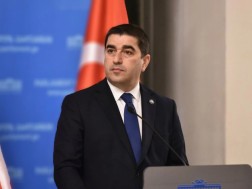The Parliamentary Assembly of the Council of Europe (PACE) supported the resolution ‘Challenges to Democracy in Georgia’ with 66 votes in favour, four against, and five abstentions.
The co-rapporters of the resolution are Claude Kern and Edite Estrela. Only the first amendment was included in the final resolution while the second amendment was rejected. The second amendment expressed: “The Assembly is also concerned about the influence of the politician and oligarch Bidzina Ivanishvili on Georgian internal and foreign politics, whose actions and statements directly threaten Georgia’s path to European Union and NATO membership. In particular, his recent statements justifying the Russian Federation’s war of aggression against Ukraine serve as evidence of his pro-Russian views, which run counter to the national interests of the Georgian people.”
Additionally, Ukrainian Rada deputy Oleksii Goncharenko withdrew the proposed third amendment to include in the 5th paragraph: “In this regard, the Assembly recalls its Resolution 2463 (2022), where it called for an immediate release of the former President of Georgia, Mikheil Saakashvili, who has been detained in a Georgian prison under inhuman conditions since 2021.”
The resolution’s complete text is as follows:
1. The Parliamentary Assembly expresses its deep concern about the recent developments in Georgia that raise serious doubts about the country’s commitment to international democratic norms and Euro-Atlantic integration, and about its willingness to honour its membership obligations and accession commitments to the Council of Europe.
2. The Assembly takes note of and expresses its full support for the urgent Opinion of the European Commission for Democracy through Law (Venice Commission) on the Law on transparency of foreign influence, and considers that this law, as well as the manner in which it was adopted by the Georgian Parliament, are incompatible with European democratic and human rights standards, as reflected in the obligations and commitments of Georgia to the Council of Europe. The Assembly is of the view that this law has nothing to do with financial transparency of non-commercial entities, including civil society organisations and media – for which a comprehensive legal framework already exists in Georgia – nor with preventing nefarious covert foreign interference, rather, it allows undue political control by the authorities over civil society and the media. The law should therefore be repealed in its entirety without any delay.
3. The Assembly is deeply concerned about the excessive and disproportional use of force by the police and the violent attacks and intimidation campaigns against demonstrators, civil society activists, journalists, and members of parliament, which amount to a crackdown on legitimate displays of disagreement and dissent. It is also concerned that these attacks and acts of intimidation are not sufficiently investigated and condemned by the authorities and that this could lead to a climate of impunity for such acts. The Assembly stresses that such actions have no place in a democratic society. It is now urgent that all reports of excessive use of force, violent attacks and intimidation campaigns be fully and transparently investigated by the appropriate authorities and that perpetrators be to brought to justice. The authorities should without delay take every necessary measure and precaution to uphold and protect the safety of all protesters, civil society activists, journalists, and members of parliament, irrespective of their opinion on this law.
4. In that context the Assembly reiterates its concerns expressed in Resolution 2438 (2022) as regards the Georgian Law on Administrative Offences, which is fundamentally flawed and allows for an overbroad application of administrative detention and excessively high fines, and which is vulnerable to abuse. The number of persons arrested or issued with – high – fines under this law during the recent demonstrations is consequently to be deplored.
5. The Assembly is concerned moreover that the controversial adoption of the Law on transparency of foreign influence is not an isolated event, but the culmination of a series of developments that clearly indicate a democratic backsliding by the country. This trend needs to be reversed. The Assembly urges the Georgian authorities to recommit in clear terms to the country’s democratic consolidation and further European integration, and to honour Georgia’s membership obligations and accession commitments to the Council of Europe, not only in words but also by concrete and tangible actions.
6. The adoption of the Law on transparency of foreign influence cannot be seen in isolation from the upcoming parliamentary elections in Georgia that will take place on 26 October 2024. The Assembly fears this law is bound to have an adverse effect on the conduct of these elections and on the trust of the stakeholders and public in their outcome, which could affect the legitimacy of the elections. This is especially the case as the adoption of this law, despite the widespread opposition against it within the Georgian society, has inevitably turned the upcoming elections into a de facto referendum on Georgia’s democratic trajectory and foreign alignment, considerably raising the stakes in these elections and adding to polarisation and tensions in the pre-electoral climate.
7. The Assembly underscores furthermore its concern about the recent adoption – despite recommendations by the Venice Commission to the contrary – of amendments to the legal framework for elections in Georgia that change the manner in which the chairperson and the non-partisan members of the Central Election Commission (CEC) are elected, and that abolished the position of a vice president of the CEC appointed by the opposition. These changes will make it possible for the ruling majority, by itself, to select and appoint the chairperson and non-partisan members of the CEC, which would, in effect, give it a majority of members on the CEC. The concerns of the Assembly are compounded by last minute amendments to the Electoral Code, adopted in a hasty manner without consultation with the stakeholders, which altered the legally required majorities for decision making by the CEC. Combined with the changes to the election process of the chairperson and non-partisan CEC members, these amendments would potentially give the ruling majority control over all CEC decisions.
8. It is clear that these changes to the Electoral Code will have a major impact on the perception and trust of the stakeholders in the impartiality and fairness of the election administration. This, in turn, will impact the manner in which the legitimacy and fairness of the elections, and their results, will be perceived and accepted by the stakeholders and the Georgian public at large.
9. Against this backdrop, the Assembly is concerned about the real possibility that – as a result of the Law on transparency of foreign influence – respected civil society organisations, with a long-standing and extensive experience in election observation, might no longer be able to observe the elections. Their exclusion as election observers would, in the eyes of the Assembly, be entirely unacceptable and certainly counterproductive.
10. The Assembly expresses furthermore its strong apprehension as regards the current draft laws on the “protection of family values and minors”, which are incompatible with international human rights standards, and in particular the European Convention on Human Rights (ETS No. 5). The presentation of these controversial draft laws on such emotionally charged issues during a pre-electoral period is regrettable. In that context the Assembly expresses its deep concern about the political manipulation of LGBTI-phobia in the run-up to elections. It calls upon the authorities to take full account of the concerns and recommendations contained in the Venice Commission Opinion on these laws.
11. The Assembly would like to pay tribute to the commitment of Georgian citizens to the country’s democratic development and further Euro-Atlantic integration, which they have continued to demonstrate during the recent developments, despite the hostile and repressive political climate. The hopes and aspirations of the Georgian citizens for a democratic future firmly anchored within the European family cannot be put aside: they must be recognised and respected.
12. The Assembly expresses its strong hope for Georgia’s democratic consolidation and further Euro-Atlantic integration. It reiterates its commitment to co-operation and a constructive and open dialogue with the authorities, as well as with all other political forces and sectors of Georgia’s society, to reverse the recent backsliding and to uphold the honouring of Georgia’s membership obligations and commitments to the Council of Europe.
13. The Assembly is aware of and concerned about already existing, or initiatives to adopt, similar problematic legislation in other member States that would allow for political control by the authorities over civil society and the media. The Assembly urges all member States to remain mindful of their membership obligations and refrain from adopting legislation that run counter to the democratic and human rights standards of the Council of Europe.
14. The Assembly invites its Monitoring Committee to continue to closely follow the ongoing developments in Georgia, including with regard to the upcoming parliamentary elections and their outcome, and report back to it immediately if the developments so warrant.
















